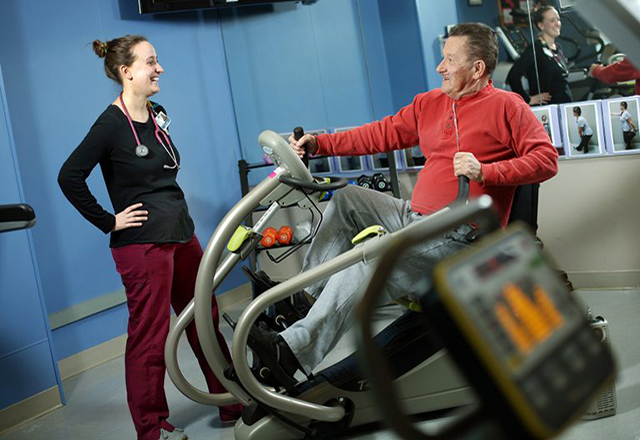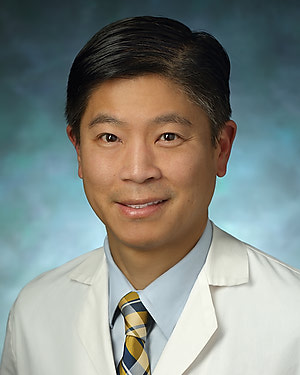
Pulmonary Rehabilitation is a specialized physical therapy program to improve the quality of life of patients with chronic lung disease. While a significant portion of the program is devoted to the exercise program for improving physical conditioning, Pulmonary Rehabilitation provides an opportunity to optimize patient’s self-management of their chronic lung disease to reduce the frequency and severity of pulmonary symptoms, reduce the risk for hospitalization, and help address anxiety and depression that may result from their chronic lung disease. This helps patients to engage in daily activities, participate in events with family and friends, and return to their previous level of function following a hospitalization or recovery from an exacerbation of their pulmonary condition. The benefits from Pulmonary Rehabilitation are not solely derived from patient contact with the medical staff, but also from supportive interactions with other patients enrolled in the program.
An important goal of Pulmonary Rehabilitation is to empower patients with the skill and confidence needed for managing their chronic lung disease.
- Improving patient understanding of their chronic lung disease;
- Reviewing breathing techniques and energy conservation strategies;
- Review techniques and devices to support airway mucus clearance;
- Addressing any questions regarding medications used for maintaining stable chronic lung disease;
- Review how and when to use home oxygen therapy and other respiratory devices;
- Recognition of symptoms that indicate deterioration of their chronic lung disease;
- Reviewing and addressing any questions regarding the action plan recommended by the patient’s local doctors.
Pulmonary Rehabilitation Staff
The Pulmonary Rehabilitation unit is staffed by a multi-disciplinary team. This is important for tailoring the program to a patient’s specific needs. The core members of our Pulmonary Rehabilitation unit include the program coordinator, respiratory therapists, physical therapists, and the medical director.
Medical Director
- Alyssa (Marlene) Pirfo, RRT (Program Coordinator)
- Marjorie McBurney, RRT
- Melanie Hall, MS, CEP
A Nutritionist is available to meet with patients to address individual needs including diet modifications for weight control, reviewing low sodium options for patients that have leg edema, and reviewing strategies to preserve muscle mass for patients who have very severe lung disease.
Who can Enroll in Pulmonary Rehabilitation?
Government regulations established by CMS outline how Pulmonary Rehabilitation for patients with chronic obstructive pulmonary disease (COPD) is supported by health care coverage. These guidelines outline how Pulmonary Rehabilitation is covered by Medicare for patients with moderate to very severe COPD. However, coverage for other lung problems is determined on a case-by-case basis and coverage may differ depending on insurance plans. The most common lung problems addressed through Pulmonary Rehabilitation include:
- COPD (which includes emphysema and chronic bronchitis)
- Interstitial lung disease (including idiopathic pulmonary fibrosis)
- Sarcoidosis
- Pulmonary hypertension
- Bronchiectasis
- Lung cancer and lung cancer surgery
- Lung volume reduction surgery
- Before and after lung transplant surgery
Referrals and Contact Information
Referrals to the Pulmonary Rehabilitation Unit must be made by a signed physician order. This must be accompanied with medical records that include:
- Physician notes within the past 1 year
- Chest x-ray or CT report within the past 1 year
- Pulmonary function tests (PFT) within the past 1 year
- Electrocardiogram (ECG) within 1 year
- Complete blood count (CBC) and basic metabolic panel (BMP) within the past 6 months
Please direct all inquiries to:
Pulmonary Rehabilitation Program Coordinator: Alyssa Pirfo, RRT
Telephone: 410-550-5579
Fax Number: 410-550-1682
Email: [email protected]
Locations
Johns Hopkins Bayview Medical Center
Pulmonary Rehabilitation Unit
Asthma and Allergy Building Fourth floor
5501 Hopkins Bayview Circle
Baltimore, MD 21224
To maximize the benefits from Pulmonary Rehabilitation, this requires a patient to participate at least 2 times a week. Please contact us to confirm that our program is the one most conveniently located to your home or place of work, or refer to one of many online resources:
American Association of Cardiovascular and Pulmonary Rehabilitation (AACVPR) Program Directory
Additional Information
- National Heart, Lung, and Blood Institute - Pulmonary Rehabilitation
- American Association of Cardiovascular and Pulmonary Rehabilitation (AACVPR)
Research Involving Pulmonary Rehabilitation Unit
The Pulmonary Rehabilitation Unit has offered opportunities for patients to volunteer in research studies. This has included:
BREATHE 2 (Better Respiratory Education and Treatment Help Empower)
The research team wants to compare two ways of helping patients and their caregivers learn to manage COPD: patients receive education and support from a respiratory therapist, or patients receive education and support from a respiratory therapist plus learn ways to manage the disease from a peer. A peer is a patient with COPD or a caregiver who has successfully managed COPD and knows the challenges patients face. Respiratory therapists teach people with COPD, asthma, and other lung diseases how to breathe more easily and manage their condition. Results from this study can help healthcare providers decide how to help people who have COPD learn to manage their condition.
PI: Hanan J. Aboumatar, M.D., M.P.H.
- Armstrong Institute for Patient Safety and Quality - The Breathe 2 Study
- Comparing Self-Management and Peer Support Communication Programs among Patients with Chronic Obstructive Pulmonary Disease and their Family Caregivers, Patient-Centered Outcomes Research Institute (PCORI)
Patient Questionnaire to Develop a Novel Long-Term Oxygen Therapy
There is a need for a portable method of delivering high flow oxygen therapy to increase the mobility, independence, and quality of life for the 1 million U.S. patients requiring flows greater than 3 L/min. We propose for the development of a new device that fulfills this need. Prior to developing this device, this proposed study aims to inform the design specifications – including range of flows, weight, and battery life– by using patient responses.
PI: Dr. Sonye Danoff, M.D., Ph.D.



